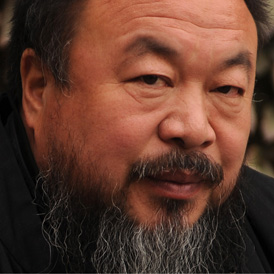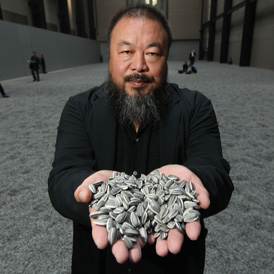Ai Weiwei still missing after being detained by police
The Chinese artist and dissident Ai Weiwei remains missing after being detained at Beijing airport. A human rights expert tells Channel 4 News authorities will not say what the artist is accused of.

Ai Weiwei was stopped on Sunday afternoon as he tried to board a flight to Hong Kong.
His lawyer Pu Zhiqiang said Ai’s phone was turned off and he was unable to contact the artist or Wen Tao, a human rights activist who was also arrested in the raid.
Police were stationed outside Ai’s Beijing studio on Monday, after seizing several computers, CDs and notebooks.
“They had a search order, but they didn’t say what crime he had been accused of,” Pu said.
A group of Ai’s assistants and his wife were taken away for questioning but were later released.
“We’ve had no information whatsoever. We don’t know what the reason is at all,” said his assistant, who asked not to be named.
“We’ve had no information whatsoever. We don’t know what the reason is at all.” Ai Weiwei’s assistant
The 53-year-old, who helped designing the Olympic Bird’s Nest stadium and created last year’s ‘Sunflower Seeds’ installation at the Tate Modern, is one of more than 20 dissidents arrested in China this year.
Foreign Secretary William Hague said: “I am very concerned by reports that Ai Weiwei has been detained by the Chinese authorities. I call on the Chinese government to urgently clarify Ai’s situation and wellbeing, and hope he will be released immediately.
“The UK remains committed to engagement with China on human rights. I am absolutely clear that the development of independent civil society and application of human rights under the rule of law are essential prerequisites for China’s long-term prosperity and stability.”
‘Comprehensive crackdown’
Human Rights senior researcher Nicholas Bequilin told Channel 4 News the crackdown on human rights lawyers, bloggers and activists is “the most comprehensive in decades”.
“It’s certainly getting worse. Even in the case of Ai Weiwei, police and the Goverment have refused to acknowledge they even have him in detention or why he’s been detained,” Mr Bequilin said.
“Not only is the scope much wider, but they’re deliberately using extra-judicial tactics to detain everyone from lawyers to activists and even ordinary netizens.”
‘Jasmine Revolution’
The Government crackdown is targeting the so-called “Jasmine Revolution”, a mostly internet-based movement inspired by the uprisings in the Arab world.
“The fact is the internet is seen as very dangerous to the Government. And if they can’t manage to curb freedom of expression through censorship, they’ll silence the opinion makers.” Nicholas Bequilin, Human Rights Watch
“It’s not a big movement in China. It’s a very different situation from what’s happening in the Middle East and north Africa, so there’s no risk of contagion.
“But it did provide a pretext for security powers to strike.
“The fact is the internet is seen as very dangerous to the Government. And if they can’t manage to curb freedom of expression through censorship, they’ll silence the opinion makers.”
Mr Bequilin says while the Government’s show of force may be working to some degree, it’s also a sign of weakness.
“The ability to so freely express oneself through the internet is really still a novelty in China,” he said.
“And it’s a much bigger threat to the Communist Party in the long term because key mehcanisms of monoply and power are gradually dissolving. They want to keep citizens ignorant.”
Calls for accountability
He’s calling for the situation to be referred to the Human Rights Council and the United Nations.
“China has voluntarily signed numerous human rights accords. And when they break them in such a flagrant manner, they should be held accountable,” he said.

Last year, Ai Weiwei was prevented from leaving the country ahead of the Nobel Peace Prize ceremony, where he was to be honoured alongside Chinese rights activist, Liu Xiaobo.
He was also placed under house arrest last year after an argument with the government over the demolition of his studio in Shanghai.
Freedom ‘not improving’
In an interview last year, Ai told Channel 4 News he did not think social freedom in China was improving.
“After 60 years in power, they still forbid people to have freedom of speech and they still jail people who have different thinking and different opinions,” he said.
“And people are still disappearing under this Goverment.
“I don’t know that it will affect the policies of the Government because they are quite stubborn on this matter.”
An exhibition of Ai’s works is due to open at London’s Lisson Gallery next month.